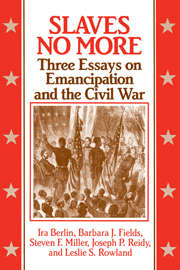3 - THE BLACK MILITARY EXPERIENCE, 1861–1867
Published online by Cambridge University Press: 05 June 2012
Summary
Freedom came to most American slaves only through force of arms. The growing Northern commitment to emancipation availed nothing without victory on the battlefield. But once federal policy makers had committed the Union to abolishing slavery, the Northern armies that eroded Confederate territory simultaneously expanded the domain of freedom. The Union army perforce became an army of liberation, and as it did, both the Northern public and the freed slaves themselves demanded that the direct beneficiaries of freedom join the battle against the slaveholders' rebellion. The incorporation of black soldiers into Union ranks at once turned to Northern advantage a vast source of manpower that the Confederacy proved incapable of tapping and enhanced the antislavery character of the war. The liberating force of black enlistments weakened slavery in the loyal border states and the Union-occupied South no less than in the Confederacy, thereby extending the nation's commitment to freedom beyond the limits of the Emancipation Proclamation. Black enlistees in the border states received their freedom, and, eventually, their enlistment also guaranteed the liberty of their immediate families. Throughout the slave states, black enlistment and slave emancipation advanced together and, indeed, became inseparable.
Black men coveted the liberator's role, but soldiering remained a complex, ambiguous experience. If most free blacks and slaves rushed to join the Union army, others entered federal service only at the point of a bayonet.
- Type
- Chapter
- Information
- Slaves No MoreThree Essays on Emancipation and the Civil War, pp. 187 - 234Publisher: Cambridge University PressPrint publication year: 1992
- 1
- Cited by



